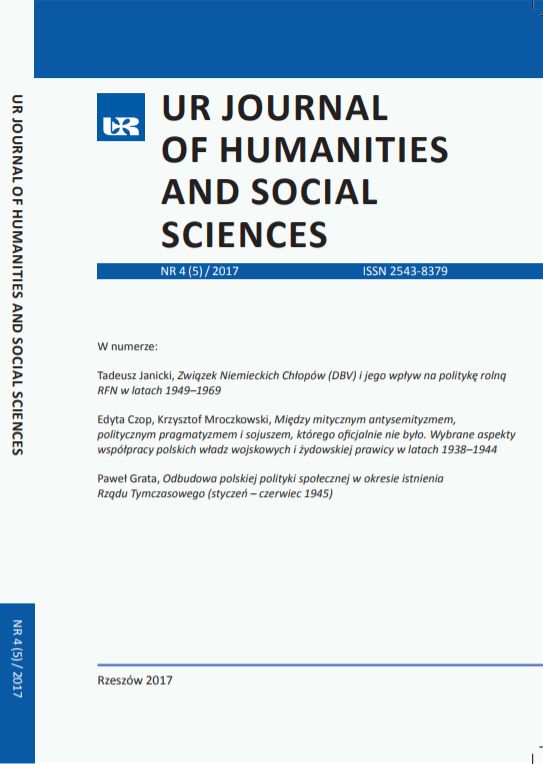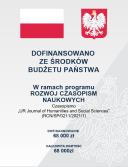British Perspective on the Role of Jews and Arabs in Palestine in the formation period of the State of Israel in 1946–1948
DOI:
https://doi.org/10.15584/johass.2018.1.1Keywords:
the British, Jews, Palestine, Arabs, J. B. GlubbAbstract
In the years 1946–1948 a conflict between the Arab and the Jewish communities took place in Palestine. The struggle ended in the victory of the Jewish side and formation of the State of Israel. In the period in questions the British authorities played an important role in these events. It was the decisions of London that determined, until May 1948, the situation in Palestine. Therefore, it is worth petting to know the opinions of British elites on the subject of Jewish and Arab communities. In particular, its opinions on the topic of the political power of the two enemies should be recognised. This issue can be partially explained on the basis of British documents and, in particular, on the basis of reports of the commander of the Transjordan Army, J. B. Glubb. It needs to be stated that the Empire elites did in fact recognise political strength of the Jewish community, but they did not recognise its military potential. Simultaneously, London overrated the military potential of Arabs. The motives of the Zionist movement and the level of its determination were not understood at all. Such a state of awareness contributed to the creation, among the British military and civil elites, of an anachronistic image of both sides of the conflict. Probably in consequence this helped London to make the disastrous decision to withdraw from Palestine in May 1948. This was tantamount to consent for war in this region. Numerous traces of evidence indicate that the British hoped for the possibility of the return of their forces as troops rescuing the weaker Jewish side, however the result of the conflict dealt a decisive blow to British dominance in the region.
Downloads
References
Chojnowski A., Tomaszewski J., 2001, Izrael, Warszawa.
Glubb J.B., 1957, A Soldier with the Arabs, London.
Glubb J.B., 1958, Britain and The Arabs. A Study of Fifty Years 1908 to 1958, London. Glubb J.B., 1983, The Changing Scenes of Life. An Autobiography, London – Melbourne – New York.
Karsh E., 2010, Palestine Betrayed, New Haven – London.
Lunt J., 1999, The Arab Legion, London.
Madeyska D., 2003, Liban, Warszawa.
National Archive (National Archives), Foreign Office 371/52567, Top secret. Amman to foreign Office. Kirkbride to C. Baxter, December 6, 1946. A Further Nat on Partition as a solution of the Palestinian Question
NA FO 371/61583, E-12325
NA FO 371/61858, A Not on the Exact Sitting of the Frontier in the Event of the Adoption of Participation
NA FO 371/61858, E-877, January 21, 1947
NA FO 371/66860, Chiefs of Staff Committee Joint Planning Staff, October 26, 1948
NA FO 371/61868, Patentialities of the Negew
NA FO 800/476.ME, Secretary of State’s to Prime Minister, January 9, 1947
NA WO 216/207, Not on Partition as a solution of the Palestine problem. J.B. Glubb to Field Marshall Lord Montgomery July 13, 1946
Ovendale R., 1996, Britain, the United States, and the transfer of power in the Middle East, 1945–1962, London – New York.
Patek A., 2002, Wielka Brytania wobec Izraela maj 1948 – styczeń 1949, Kraków.
Pundik R., 1994, The Struggle for Sovereignty: Relations between Great Britain and Jordan 1946–1951, Oxford.
Vatikiotis P.J., 1967, Politics and Military in Jordan: A study of the Arab Legion 1921– 1957, London.
Wilson M.C., 1999, King Abdullah, Britain and the making of Jordan, Cambridge.
Downloads
Published
How to Cite
Issue
Section
License
Copyright (c) 2018 Wydawnictwo Uniwersytetu Rzeszowskiego

This work is licensed under a Creative Commons Attribution-NonCommercial 4.0 International License.



